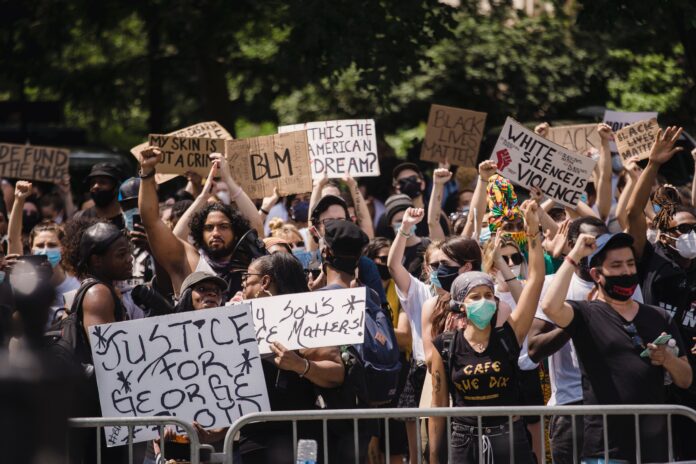They’re part of a system of mutual aid groups that came together after Floyd’s murder to meet the needs of a grieving and recovering community.
Floyd’s killing ignited an international outcry, transforming Minneapolis into the global epicenter of a powerful movement for justice and change.
For days, protests raged on, and local businesses burned down. All of this was compounded by the existing pain of grappling with the new realities of living through the COVID-19 pandemic. The day after his death, reports found nearly 900 people died from the virus in the Twin Cities metropolitan area.
Mutual aid became critical for communities across the United States — and especially for Minneapolis.
As a concept, mutual aid has been an integral part of history for Black communities since the late 1780s.
Based on community solidarity, mutual aid unites members to solve common problems and provide care for one another. Those involved, like Twin Cities Logistics Collective, a mutual aid group in Minneapolis, Minnesota, say it’s not the same as charity.
“Mutual aid is not something that comes from governments, or businesses, or even nonprofits. It is anti-capitalist, it is in opposition to the state, it is decolonizing,” the organization’s website explains. “In presenting a more robust, distributed, and democratic alternative to top-down service provision, it is a way to dismantle oppressive structures and the power they hold over people and resources.”
Since the “racial reckoning in 2020,” several mutual aid groups and organizations that provided help in Minneapolis, have ceased, but those on the ground, doing community work, say mutual aid is alive and well.
‘When the World Was Topsy Turvy, We Had Each Other’ “When the city completely turned their back on us, they shut down stores, barricaded us in, and had the National Guard watching us,” says Jennie Leenay, the Minneapolis community member behind The People’s Closet, a mutual aid community clothing closet located at George Perry Floyd Square. It’s a converted Metro Transit bus stop that also serves as a forum for community news.
“We had no access to basic needs, so we all joined together to help each other out in that very trying time,” Leenay says.
Leenay, who uses she/they pronouns, says people drop off clean clothes they no longer wear, and folks in the neighborhood make sure it’s seasonally appropriate clothing.
An interactive map illustrated by Ameen Taahir shows other aspects of the square, which is maintained by local volunteers who do community cleanups and repaint after the winter.
“Pretty much since the uprising, this has been my life,” Leenay told Word In Black. When the pandemic started, they were an apparel technologies student. “I believe fashion is culture, and culture should be passed down, so that’s what I’ve tried to perpetuate with The People’s Closet.”
As for why there may be fewer groups or less activity within mutual aid groups, Leenay says it may have to do with a need to rejuvenate and focus on mental and physical health.
To Leenay, time off is deserved and needed for the betterment of the community. She stands by the community’s saying, “Don’t come begrudgingly, and don’t give begrudgingly.”
Everett Ayoubzadeh, a photographer and former resident of Minneapolis, says that while the need for mutual aid hasn’t changed, it became increasingly difficult to maintain the scale of giving as the pandemic and protests continued.
In the aftermath of the protests over Floyd’s murder, the Baha’i Center of Minneapolis, with the help of nonprofit Organic Oneness and Eliza Wesley, collected donations. The faith-based center is only a block away from George Perry Floyd Square. The basement became a dedicated space to hold donations. Much of what they received were diapers, feminine hygiene products, and shelf-stable foods.
Because of the limitations of the space, Ayoubzadeh says the Baha’i community found it challenging to meet the broader community’s needs. They couldn’t install refrigerators, meaning they couldn’t provide items like dairy products and eggs.
That wasn’t the only difficulty. To keep things going, the center needed more volunteers.
Initially, they had “so many people,” wanting to volunteer, Ayoubzadeh says.
“But after the first couple of months, it was like fewer and fewer people had the time to set up ongoing aids that were really meeting the needs of the folks in that immediate area.”
EVERETT AYOUBZADEH, PHOTOGRAPHER
Ayoubzadeh moved to North Carolina in October of last year, but continues his connections with the neighborhood.
And despite the challenges, it’s still fulfilling work for Leenay and Ayoubzadeh.
“I love running The People’s Closet — it’s such a delight,” Leenay says. “It’s a true resource that people depend on, and that’s the thing about mutual aid; it never really goes away because as long as you’re maintaining each other, you’re maintaining everything.”
_____



